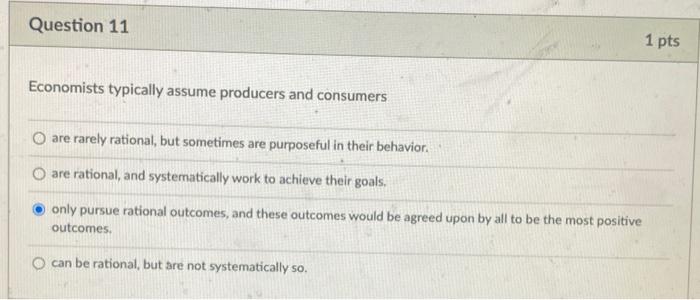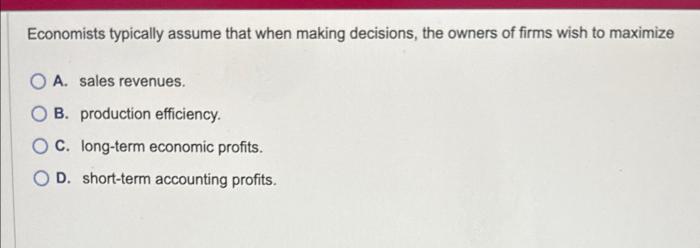Economists typically assume producers and consumers behave rationally in pursuit of their self-interest. This assumption underpins much of economic modeling, but it has also been criticized for its limitations. This article examines the assumptions economists make about producers and consumers, their implications for economic analysis, and alternative approaches to modeling economic behavior.
The second paragraph provides a more detailed overview of the topic, including the rationale behind the assumptions economists make about producers and consumers.
Assumptions in Economic Modeling

Economists typically assume that producers and consumers are rational actors who make decisions based on their own self-interest. This assumption is essential for economic modeling because it allows economists to predict how individuals will behave in response to changes in economic conditions.
Assumptions about Producers

Economists typically assume that producers are profit-maximizing firms that operate in a competitive market. This assumption implies that producers will make decisions that maximize their profits, taking into account the costs of production and the prices of their products.
Rationale, Economists typically assume producers and consumers
The assumption of profit-maximization is based on the idea that firms are owned by shareholders who want to maximize their returns on investment. In order to do this, firms must make decisions that increase their profits.
Implications
The assumption of profit-maximization has several implications for economic analysis. First, it implies that firms will produce goods and services that consumers want at the lowest possible cost. Second, it implies that firms will be willing to enter or exit markets in order to maximize their profits.
Third, it implies that firms will compete with each other to gain market share and increase their profits.
Assumptions about Consumers: Economists Typically Assume Producers And Consumers
Economists typically assume that consumers are rational actors who make decisions based on their own self-interest. This assumption implies that consumers will make decisions that maximize their utility, taking into account the prices of goods and services and their own income.
Rationale, Economists typically assume producers and consumers
The assumption of consumer rationality is based on the idea that individuals are capable of making decisions that maximize their own well-being. This assumption is supported by a large body of research in psychology and economics.
Implications
The assumption of consumer rationality has several implications for economic analysis. First, it implies that consumers will purchase goods and services that maximize their utility. Second, it implies that consumers will be willing to substitute one good for another if the price of the first good increases.
Third, it implies that consumers will save for the future in order to maximize their long-term utility.
Limitations and Exceptions

The assumption that economists typically assume producers and consumers are rational actors is a simplification of reality. In reality, producers and consumers may not always make decisions that maximize their own self-interest. There are a number of factors that can lead to irrational behavior, such as emotions, cognitive biases, and social norms.
Examples
- Producers may not always be profit-maximizing. For example, a firm may choose to produce a good or service that is not profitable in order to gain market share or to build a brand.
- Consumers may not always be rational. For example, a consumer may choose to purchase a product that is more expensive than another product that is of equal or better quality.
Query Resolution
What are the key assumptions economists make about producers?
Economists typically assume that producers are profit-maximizers who operate in a competitive market.
What are the key assumptions economists make about consumers?
Economists typically assume that consumers are utility-maximizers who have perfect information about the products and services available to them.
What are the limitations of the assumption that economists typically assume producers and consumers?
The assumption that economists typically assume producers and consumers is a useful starting point for economic analysis, but it has limitations. For example, it does not account for the role of emotions, social norms, and other factors that can influence economic decision-making.
